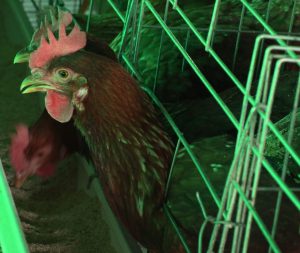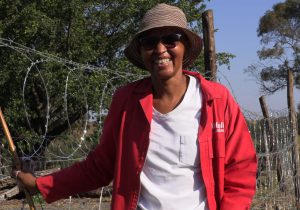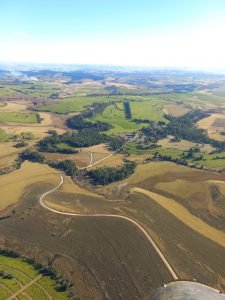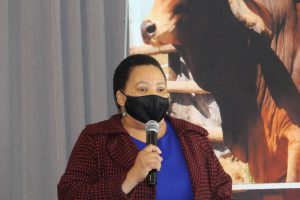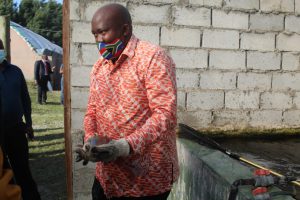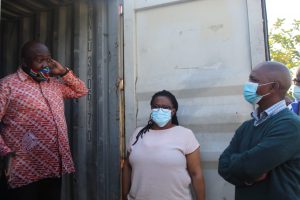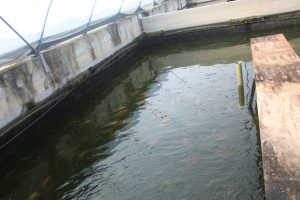
by Olwetu Batyi | Aug 2, 2021 | atp1

Government intervention becomes lifeline to poultry farm
WITH South Africa currently experiencing untimely power outages that are attributed to dilapidated electrical infrastructure, many businesses whose operations customarily depend on the availability of electricity have either had to close or suspend sections of their operations to avoid wastage.
It is no doubt that technological developments have come in handy in the improvement of quantity and quality of production; and the agricultural sector which is crucial to both the country’s economy and livelihoods of citizens is one of the key beneficiaries to these advancements.
However, since the dawn of power shedding by the country’s power utility, the sector has suffered immensely with the less equipped developing farmers being the ones who feel the brunt the most.
Pilisa Fadana who runs a poultry farm in Haga Haga where she breeds chicken from electrical incubators to fully grown chicken that she sells to both formal and informal market in the Buffalo City Metro is back on full swing with a renewed hope after her business nearly closed down.
Fadana orders fertile eggs from a Johannesburg-based hatchery and incubates them in her Mhlelisa Farm. In the farm she rears broilers, boschveld, orpington and different breeds of layers.

Her business was on a brink of closure when she was hard-hit by power outages that saw her suspending the chicken hatchery services of her enterprise. But the Department of Rural Development and Agrarian Reform has since given Mhlelisa Farm a lifeline through its Covid-19 relief fund which Fadana used to purchase 230V (5.5 kW) generator that feeds power to both her incubators and six chicken houses.
“Incubators always need to be powered when there are eggs inside and a 5-minute outage can be catastrophic. As much as I can’t remember the loss in figures, but I suffered severely when load shedding was implemented because we’d go two to four hours without electricity. The eggs would be spoiled even the chicks that have just hatched would die from cold while the few that survived wouldn’t grow at the expected rate,” said Fadana.
Fadana further used the disaster relief to reinforce security measures in her farm like CCTV cameras, feed milling machine, razor wire and used the remaining to buy feed.
“Almost all the production machinery in the farm uses electricity –from the borehole that we use for water to incubators, including lighting and heaters in our chicken structures,” she said.
The 54-year-old who hails from Ngcobo ventured into farming on a state-leased farm in 2011 following a horrific car accident in 2009 that kicked her out of her job where she was hired as a banker.
But thanks to her experience in subsistence farming, Fadana had to learn the ropes of the industry and trade at a commercial scale.
With only sheer determination and maternal instincts, she rose to bigger stages and bagged awards in the categories of both emerging farmer and subsistence farmer.
“Being honoured is motivating. It’s a way of saying ‘we see you. And you are on the right track’. Receiving the awards pushed me to work even harder on myself. But being a mother who has nurtured babies into adults has also helped me in the caring of my livestock,” she added.
To this day Fadana is just inches away from clinching life-changing deals of supplying one of the country’s biggest chain stores –a development which she couldn’t dwell much on due to contractual matters.
“The support I have been receiving from the department has brought in consistency in my business as far as production is concerned because now I am never out of stock. I am currently working on adding more chicken structures so I can be able to meet all the demands of the market. I have also managed to negotiate deals to supply some international businesses that are located in East London but the deal is on its infant stages and we are yet to sign on the dotted line,” said Fadana.
The family-run business employs four workers on a permanent basis but with expansion on the cards, Fadana foresees more opportunities.

by Olwetu Batyi | Jun 28, 2021 | atp1

Magwa Tea Estate in pictures














by Olwetu Batyi | Jun 25, 2021 | atp1

Al-Mawashi reveals developmental plans for EC farming sector
EASTERN Cape farmers of various commodities are set to benefit grandly from the international trading stage facilitated by the Eastern Cape Department of Rural Development and Agrarian Reform and Al-Mawashi South Africa.
Al-Mawashi is a trade and exporting company from Kuwait that began trading in livestock with Eastern Cape farmers in 2019. More than hundred thousand livestock have been shipped to Middle Eastern countries from the East London harbor since Al-Mawashi struck a deal with local farmers with the livestock exported mostly being sheep.
Today [June 23] the company finalized the loading of 56000 sheep and 1000 cattle destined for Kuwait and MEC for Rural Development and Agrarian Reform, Nonkqubela Pieters joined the delegation and witnessed the loading of the herd of cattle at the East London harbor.

With the Eastern Cape being known as the capital of livestock, the international market has opened a channel for both fully-fledged farmers and the developing ones who have been struggling to secure a stable market for their animals.
The trade between Al-Mawashi and Eastern Cape farmers has been around livestock but Al-Mawashi South Africa managing director, Ilyaas Ally has revealed their grand developmental plans for farmers of different commodities in the province.
In an engagement session with MEC Pieters ahead of their shipment, Ally revealed that the Middle Eastern countries have shown interest in locally produced food like vegetables, fruits and honey among others.
“We have been exporting live and chilled meat, but taking into consideration that there aren’t much farmlands that side, 90% of their food is imported. And we are exploring to diversify with the above as we have seen the growing interest and demand for them,” said Ally.
He added that they will be embarking on a drive to uplift developing farmers across the six districts in the province. This done together with Department of Rural Development and Agrarian Reform, ECDC and ECRDA
The partnership will see Al-Mawashi signing offtake agreements with two emerging farmers each district and this will help farmers to access credit as the deal will guarantee them a sale of 3000 livestock a year.
“There is a lot we are planning for the Eastern Cape and everybody is set to benefit and we will be going on a roadshow soon if the covid 19 regulations allow,” he said.

In each shipment of the livestock, Al Mawashi spends at least R150 million in the province and some of the beneficiaries include livestock feed producers as the company utilizes 30 000 tons of feed in its four shipments a year.
MEC Pieters pledged the department’s support to the strategic partnership and said the interest shown by the Middle Eastern countries to Eastern Cape agricultural commodities would spark an interest in diverse farming and make locals realize the value of land.
“Government continues to encourage people to work the land and actively partake in local and international trades. These developments greatly contribute in growing the economy of this province,” said Pieters.

by Olwetu Batyi | Jun 25, 2021 | atp1

Empowering Youth in Agriculture
As we draw a close towards the youth month , the departmental special programmes unit’s youth desk coordinator Ms Vuyo Roloma working together with sister departments and government agencies like NYDA converged in Western district to engage and inform young people about the opportunities available in the various organisations
Welcoming the delegates, Mr Nyokana District Director in the Western Region said ” The department continues to support young people and this is evident through the formation of youth in agriculture (YARD) in 2016. This has created a platform for young people to make their mark in the agricultural space by attaining awards from Provincial and National Competitions.

Mrs Manitshana, Director for Special program advised the youth to apply in the recent advert issued by the department.
” Through the National grant funding like CASP for infrastructure, Ilima Letsema for food security and Siyazondla young people are supported “concluded Manitshana
Agricultural graduates are also placed in commercial farms for a 24 months period and are encourage to finish the two years with a business plan were they are able to start their own business.
Siyabulela Zondani from NYDA and Zungu Mene from DEDEAT also shared the support they provide and how young people can access the information.
Key challenges raised by the youth
- Land ownership
- Assistance in filling the application forms for funding
Replying on behalf of young people in the region Thulethu Nombona , appreciated the opportunity that has been given to them.
He promised that they will spread the word to those who were not able to attend, she also added that “as young people were are capable of making this sector fashionable and we are going to do our best with the opportunities given to us”

by Olwetu Batyi | Jun 25, 2021 | atp1

MEC Pieters calls for diverse farming in Eastern Cape
AMID the promising international trade channels that government is aggressively unlocking, MEC for Rural Development and Agrarian Reform, Nonkqubela Pieters encourages local farmers to broaden their scope of production and venture into the uncharted commodities.
With Eastern Cape known as the livestock capital in South Africa; wool, mohair and grain are among the commodities that have become the flagship of the province’s farming sector, including citrus.
To ensure continuous trade in almost every commodity, Pieters is calling on Eastern Cape farmers to be as diverse as possible in their farmlands so to create assortment even in investors and the market.
Putting action behind her words, this week Pieters crisscrossed the province visiting enterprises that trade in different commodities where she landed at the Port Alfred-based Lilac Holdings -Tilapia Fish farm.
Tilapia is the common umbrella name for nearly a hundred species of cichlid fish and according to co-owner of Lilac Holdings Tilapia Fish farm, Morena Khashane who is an aquaculturist, there has been a growing demand for the commodity both locally and nationally as a result of globalization and migration.
There are eight tunnels in the farm with each having two tanks inside that can accommodate a maximum of 15000 fish. Khashane and his two business partners started the business in 2019 with R5 million capital which they raised themselves. During their stint in the industry they have managed strike a deal with one of the country’s leading fish distributor.
“Pick n Pay is also one of our customers, including various fish and chips outlets in the province. But our greatest milestone so far has been supplying, Lake Harvest –a fish distributing company that operates in Gauteng but distributes across the country said Khashane.

The black-owned fish farm doesn’t breed its own fish at the present moment but buys finger links in Makhanda (Grahamstown) at a weight of about 2kg and grow them for a period of six months in their tanks under the recirculated water system.
However, as much as the demand for their produce is high, there are challenges that weigh the business down which Khashane shared with Pieters. Most of these are infrastructural.
“So far we have sold more than 30 000 fish and we can’t meet our customers’ demand because our infrastructure doesn’t allow us.

We are in a dire need of operating inputs. The business can take care of the rest of its needs because even the water we are using here is from our boreholes,” said Khashane.
The farm also assists the Ndlambe Local Municipality with water from its borehole.
With the international trade company, Al-Mawash showing interest in various locally produced food, great opportunities await Eastern Cape farmers in the industry.

by Olwetu Batyi | Jun 23, 2021 | atp1

Weather favours Sunday’s River Valley citrus growers
WHILE majority of farmers of various job commodities complain about the effects of the current climatic status which are largely contributed to global warming, citrus growers in the Sunday’s River Valley Local Municipality are singing a different tune.
The area has experienced less gust so far in the year compared to past years and citrus growers in the area have become the few if not the first producers in the farming sector to express delight and fulfilment in the current environmental conditions.
To them less blowing winds guarantee high quality yields with reduced leave marks on their fruits. Leave marks are caused when leaves and fruit rub together and at times bounce to each other from being blown by wind.
This is the story of Sikhula Sonke Enterprise that manager, Buyiswa Ndyenga expressed with a wide smile to MEC for Rural Development and Agrarian Reform, Nonkqubela Pieters.

After having led a harvesting session in the Upper Kat Citrus growers two weeks ago in the Amathole District, Pieters continued her tour to Kirkwood, Sarah Baartman District in a move solely aimed at developing the sector further. The developments mean improving farmworkers’ working conditions, catapulting new entrants and penetration of the market.
“Citrus, wool and mohair are some of the economic corridors in the area and while we explore other avenues, let’s continue to build a formidable sector in all respects. This means we need to be primary, secondary and tertiary producers so to add value in our resources. But in order for us to continue lifting the country’s flag high in the commodity (citrus) we need to work together and align our visions and plans,” said Pieters.
She said the government’s plan was to strengthen the already thriving sector by allowing new entrants opportunities to scale up and participate meaningfully in citrus production.
“The future belongs to the young and fresh. That is why even you as farmers keep planting new trees when the old ones can no longer bear fruits. It is that reason that even in the farming sector we want create a create a conducive environment that will allow young people to thrive in their province not elsewhere because our precious resource in the Eastern Cape is farmland,” she said.
Citrus producers in the Sunday’s River Valley Local Municipality are among the top employers with more 4000 workers.
Relaying their story as Sikhula Sonke Enterprise, Ndyenga said under the enterprise they have five farms. Four of the farms are leased from DRDAR and the growers bought a fifth farm from their profits to extend their orchards to 378ha.

Sikhula Sonke Enterprise employs 568 seasonal workers, 57 permanent staffers and 11 managers. The Willowtree Farm which Pieters joined the harvesters on the orchards employs 96 seasonal workers and 17 permanent workers.
The woman-led enterprise was established in 2007 and has 12 direct beneficiaries. Sikhula Sonke Enterprise has been working closely with the Sunday’s River Citrus Companies and DRDAR. From its inception, DRDAR aided Sikhula Sonke with tower spray machine (3000lt), citrus bins and production inputs while the Sunday’s River Citrus Companies provides technical support, upskilling of the beneficiaries and workers also production process of the fruit from planting of trees to packaging of the fruit.
Sikhula Sonke through SRCC sells their fruit in 32 countries across the globe including China, Russia, Middle East and
they benefit in the direct marketing and sales relationship of local retailers such as Pick n Pay, Shoprite, Checkers and Woolworths.
Dyenga said this season’s harvest guarantees them high margins that could translate to more permanent jobs if the weather conditions continued to be in their favour.
